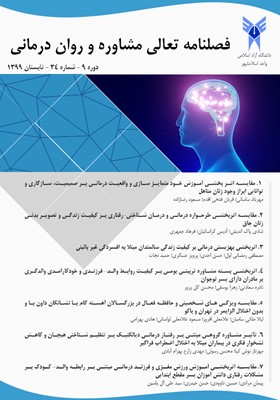مقایسه اثر بخشی آموزش خود متمایز سازی و واقعیت درمانی بر صمیمیت، سازگاری و توانایی ابراز وجود زنان متاهل
محورهای موضوعی : فصلنامه تعالی مشاوره و روان درمانیمهرداد ساسانی 1 * , قربان فتحی اقدم 2 , مسعود رضازاده 3
1 - مدرس دانشگاه غیر انتفاعی میزان تبریز
2 - دکتری روانشناسی ،استادیار روانشناسی، دانشکده علوم تربیتی و روانشناسی، دانشگاه آزاد، ابهر، ایران
3 - کارشناسی ارشد مشاوره خانواده
کلید واژه: سازگاری, صمیمیت, ابراز وجود, آموزش خودمتمایزسازی, آموزش واقعیت درمانی,
چکیده مقاله :
چکیده هدف: پژوهش حاضر با هدف مقایسه اثر بخشی آموزش خود متمایز سازی و واقعیت درمانی بر صمیمیت، سازگاری و ابراز وجود زنان متاهل انجام شد. روش: پژوهش حاضر نیمه آزمایشی با استفاده از طرح پیش آزمون - پس آزمون و پیگیری با گروه کنترل بود. جامعه آماری کلیه زنان متاهل دارای مدت ازدواج زیر 5 سال و سن بین 20 تا 40 سال شهر تبریز بودند. نمونه آماری 45 زن متاهل، که به روش نمونهگیری در دسترس انتخاب و به روش تصادفی در دوگروه آزمایش، یک گروه برای آموزش واقعیت درمانی و یک گروه برای آموزش خود متمایز سازی (هر گروه 15 نفر) و یک گروه گواه (15 نفر) جایگزین شدند. برای جمع آوری دادهها در مرحله پیش آزمون- پس آزمون و پیگیری از پرسشنامه صمیمیت زناشویی (باگاروزی، 2001)، پرسشنامه سازگاری (اسپانیر، 1976) و پرسشنامه ابراز وجود (گمبریل و ریچی،1975) استفاده شد. دادههای بدست آمده با روش تحلیل واریانس با اندازهگیری مکرر تحلیل شدند. یافته ها: نتایج نشان داد، آموزش خود متمایزسازی و واقعیت درمانی بر صمیمیت، سازگاری و ابراز وجود زنان متاهل موثر است. همچنین بر اساس نتایج، بین اثر بخشی آموزش خود متمایزسازی و واقعیت درمانی بر صمیمیت، سازگاری و ابراز وجود زنان متاهل تفاوت معناداری وجود ندارد. بحث و نتیجه گیری: با توجه به نتایج تحقیق میتوان بیان کرد برای افرادی که از صمیمیت، سازگاری و ابراز وجود کمی برخوردار هستند میتوانند از خود متمایزسازی و واقعیت درمانی به عنوان روش درمانی استفاده کنند.
Purpose: The present study aimed to compare the efficacy of self-differentiation and the reality therapy training on the intimacy و adaptation and assertiveness of the married women. Methodology: The research method was semi-experimental using a pre-test,post-test and follow up design with a control group.The community of society was all married women whose terms of marriage were under 5 years and their age were between 20 and 40 years in Tabriz city.A sample of 45 married women was selected available method and randomly assigned to two groups of experiments, a group for the treatment of reality therapy and a group for self-differentiation training (each group was 15) and a control group (15 people). To collect the data, the pre-test and post-test stages, Marital intimacy questionnaire (Bagarozzi, 2001), adaptation questionnaire (Spanier,1976) and assertiveness questionnaire (Gambbridge & Richie, 1975), were used. The data were analyzed by repeated measures analysis of variance. Findings: The result showed that the self-differentiation and the reality therapy training is effective on the intimacy and adaptation and assertiveness of the married women. Also, based on the result, there is no significant difference between the efficacy of self-differentiation and the reality therapy on the intimacy and adaptation and assertive of the married women. Conclusion: According to the results of the study, it can be stated that for those who have little intimacy, compatibility, and self-expression, use self-differentiation and reality therapy as a treatment.
_||_

